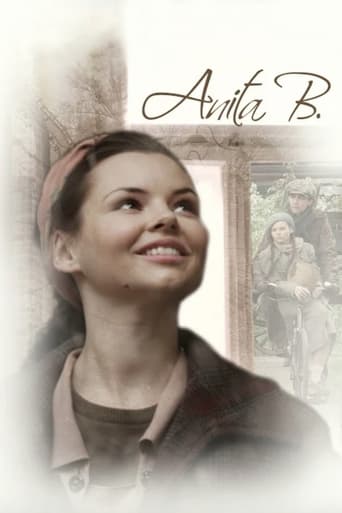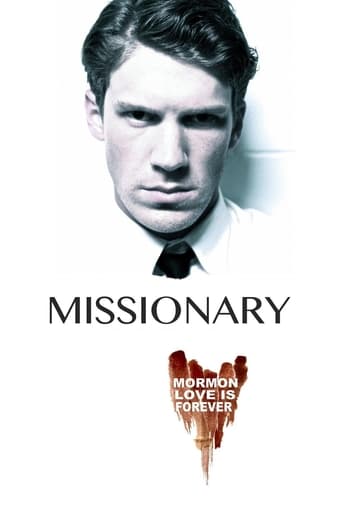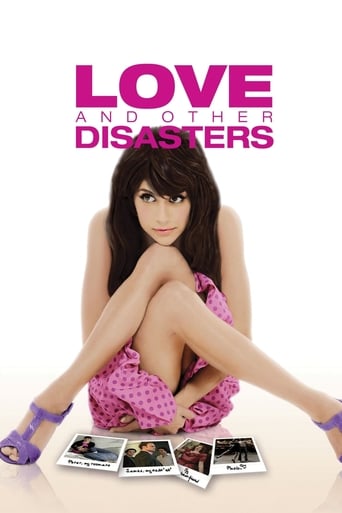Anita B. (2015)
After World War II, Anita, a young survivor of Auschwitz, becomes involved in an intense and passionate affair that almost shatters her until she gains the strength to start a new life.
Watch Trailer
Cast


Similar titles
Reviews
Strong and Moving!
As Good As It Gets
If the ambition is to provide two hours of instantly forgettable, popcorn-munching escapism, it succeeds.
I really wanted to like this movie. I feel terribly cynical trashing it, and that's why I'm giving it a middling 5. Actually, I'm giving it a 5 because there were some superb performances.
Anita B. is tale of self-discovery in a post-Holocaust Europe. At the film's commencement, the eponymous protagonist travels to Czechoslovakia, where she is taken in by her aunt, Monika. In this new place, from amidst a medley of nationalities reconciling themselves with the enormous loss that the society has sustained, Anita grows close to Eli, her uncle's younger brother. Their budding relationship is convoluted and complex, just as the character of Eli is itself complex, and Anita's own attitude towards her burgeoning 'love' seems to fluctuate due to her uncertainty as to Eli's true intentions. Although this film is a story of how Anita comes to terms with her identity as a survivor, it is also a story of how she steps up to command her identity as an individual. She befriends David, a determined young man with an equally tragic past; Edith, her musically inclined neighbor who helps her navigate the path of love; and Sarah, who organizes the passage of Jewish refugees to Palestine. The film begins with spanning panoramic shots of the wildernesses of Central Europe, and, as Anita makes her way into society and a more populated community, the sepia-toned color palate functions as a comment on how the lives of the characters have been washed of color in the aftermath of WWII. As the film progresses, we begin to see this sepia palate juxtaposed by isolated colors' vibrancies – when Anita takes a chance and begins to decorate the walls of her aunt's home with colorful depictions of the countryside, for example. This growing appearance of color is proportionate to the sporadic blooms of brightness that are gradually pulling the characters back into normalcy. Aside from the aesthetically appealing cinematography, the relationship between Eli and Anita is the most interesting aspect of the film. Both Eli and Anita seem unsure of how to interact with the opposite gender – Eli defaults to crude force, and Anita, to submission – and their developing romantic relationship struggles to thrive under the pressure of convolution. We, as an audience, experience Anita's fluctuating mistrust and love and heartbreak as her interactions with Eli unfold, culminating in the accidental pregnancy. Eli straddles the roles of brother, father, and lover as he guides Anita through her journey to normality, and for this, Anita is understandably grateful. Her feelings of gratefulness develop into a misguided, child-like love as she gives into Eli's forceful advances. Even as Eli reveals himself to be outwardly violent and domineering, Anita desperately clings to the idea of love – something she has sorely been without amidst all of her terrible experiences. She does not realize that she herself has fallen out of affection for Eli until a kindly doctor reveals a courage and determinedness in her that she had thought lost. While the film's plot is, at times, slow, it does an impressive job of capturing the texture and tide of life. We need those moments of leisure in order to appreciate the dramatic shift that has taken place between Anita's life at the concentration camps and her life in her aunt's household. It is because the film mimics the sporadic banality of life that we understand how she has become so comfortable in her new life, and how hard it must have been for her to summon the courage to abandon it for her journey to Palestine.
Wow, I have no idea what the rest of you saw, but I gotta agree with enrico on this one. I saw this movie when I was visiting my girlfriend during her study-abroad program in Rome. We saw it together, and after the movie ended, both had the same reaction: "...eh" Yea, the picture is, generally, 'pretty.' But honestly, the plot moves slowly, it plods through -- I cannot stress how much plodding goes on... it's boring uneventful scene after boring uneventful scene, two hours of my life that i'll never get back -- until, MAGICALLY everything resolves itself. The protagonist is an overly simplistic, naive girl -- which makes sense, I guess, since it seems like this movie was written with an audience of overly simplistic, naive girls in mind. So. Thumbs down. It's mostly the script, guys. The combination of formulaic characters AND unfortunately slow plot.
I found Anita B. to be a very compelling movie. It deviated from the normal Holocaust narrative, choosing to focus on the survivors and those who did not want to remember. It portrayed the complexities and diversity in the way that victims deal with grief and trauma. It showed those who choose to forget and those who fought to remember. By choosing to not focus on the horrors of what actually happened in Auschwitz the movie depicts the unsettling idea that those who survived were not necessarily free. Being Jewish is still not something Monika is proud of. Surviving is not something Monika is proud of instead she is ashamed. This showing how surviving the Holocaust is just one small piece to an individual's recovery. There is so much grief and guilt that individuals dealt with because they survived while the people they loved were killed. Another aspect I found intriguing about the film was how Anita's caring for Rob foreshadowed her future of motherhood. I think that the relationship she builds with Roby throughout the film is important because it proves to the viewer, and to Anita herself, that she can handle motherhood. This is important because it also highlights her growing confidence and independence. Her pregnancy becomes a symbol of the future and the possibilities of the future. I think an interesting line in the film is when Eli says that he does not want to bring a child into this world, implying that this world is too evil for a child to have to suffer through. However, I think that Anita's child symbolizes something completely different: that another generation will come and that this generation won't know the pains of the Holocaust the way Anita does. Her child symbolizes a hope for the future and the possibility of a better future for all persons. The movie ends on a hopeful note. Anita sets out on a journey by herself, without a man. She has grown into the woman she wants to be and she has taken charge of her life. She is no longer afraid.
"Anita B." tells the uplifting story of a young Jewish girl' s journey of self discovery after surviving the terror of internment camps during Nazi control of Germany. Left with no other family, Anita goes to live with her Aunt in Czechoslovakia where she discovers her aunt wishes that she leave feelings and stories about Auschwitz in the past. Her family is also hesitant to embrace their Jewish culture for fear of repercussions. During the film Anita experiences love and heartbreak but most importantly learns she is more than the number tattooed on her arm.It is easy to forget that the effects of the Holocaust lasted long after World War 2 ended. Roberto Faenza tackles the job of directing a film that allows the audience to contemplate the less addressed issues caused by the holocaust, such as the return home of millions of Jews back into communities that were far from ideal. Anita B's story of recovery is beautifully portrayed.The film also manages to depict various ways the Jewish people cope with their losses and degradation of their culture after the Holocaust. The essence of a recovering society and the struggle of one young girl to thrive in a community torn after the war is highlighted magnificently in this film. The Romance between Eli and Anita shown in the film is far from one dimensional. As Anita's character progresses so does the complication of her and Eli's relationship. The relationship allows us to see the depth of Eli's character. At times we laugh at the young witty Eli who seems to be far from harmful. Other times we hate him and hate how he is treating Anita. We yell at out at her in our minds to leave him already. And there our times still where we simply understand him. We see how the tragic events of his past have affected him and understand why he is the way he is.The acting in this film is another thing that deserves high praise. Eline Powell does a wondrous job portraying Anita. Powell shows incredible character development as Anita is reintegrated into society. The actress's allows the viewer to relate and empathize with the character, we as an audience are able to feel Anita's sense of imprisonment when she is forced to remain within the boundaries of her house, feel her pain when she realizes her love is not pure and feel her hopefulness when she is finally given a chance to start fresh.Overall I highly recommend that you go see this film. Anita B. is a story of romance, a story of loss and a story of survival. It leaves us with an uplifting message to find our own inner strength just as Anita did. The movie pushes us to recognize our ability to determine our own future. It's departing remarks remind us that you and you alone are responsible for accomplishing your dreams.














